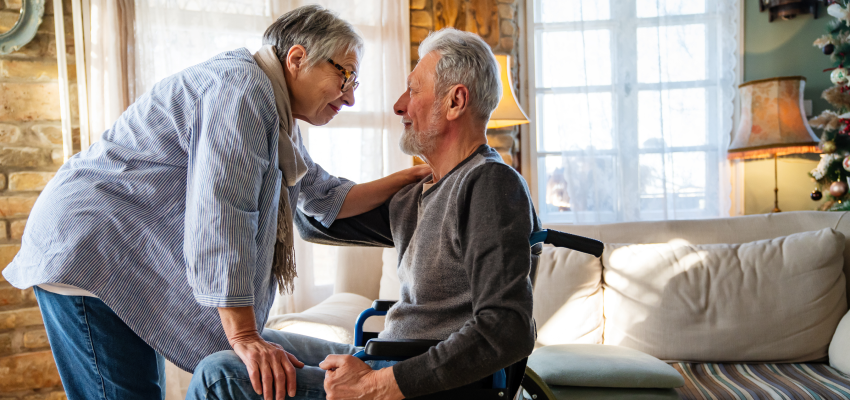How to be a Family Caregiver; Resources and Answers

Table of Contents
Becoming a caregiver for a friend or family member is a life-altering action with many responsibilities, changes, and questions. Sometimes we don’t feel like we have a choice; sometimes, becoming a caregiver just “happens.”
Am I A Caregiver?
Are you caring for someone physically, financially, emotionally, or in a way that they would not do well without you? You are a caregiver if you help an aging family member, someone with a medically complex condition, or a spouse or friend with disabilities.

If you could see your whole life from start to finish, would you change things? - Dr. Louise Banks, “Arrival”
Caregiver Concerns
These universal questions surface as someone who cares for another person, AKA a caregiver.
- Do I have to call myself a caregiver? Does that matter?
- Am I going to provide medical assistance?
- How do we afford this?
- Who can help me?
- Can I get paid to be a family caregiver?
- How can we or I get some financial help?
- What if I hate it / can’t do it/ won’t do that / fail?
- Am I in over my head?
Family caregiving is a selfless act of service, love, duty, dignity, and humanity. While assistance from health professionals may be part of the team, most of the time, family members and friends are the primary sources of support.
The other common caregiver reality is being short on time with a long to-do list. So let's take some practical steps to get you started and keep you going. If you need support now, check out our partners below.
Partners in this Article
What Does a Caregiver Do?
A caregiver is a loosely defined role, especially for those not from the health or wellness profession. That may be why most of us do not identify with the 'caregiver' label or feel qualified to call ourselves that. We are just friends or relatives of the person we help. This role comes with no other prerequisites.
If you are reading this article, the caregiver you will likely become is the person who is mostly 'in charge' of caring for someone with a chronic condition, a disability, or who is otherwise unable to care for themselves independently.
We organized our website into five categories with info and partners to get you what you need to succeed: care support, finances, legal, health, and housing.
What’s Your Caregiver Situation?
Are you helping someone now? Whether you provide full or part-time care, there’s a general list of responsibilities and daily tasks. Caregiving doesn’t look the same for everybody, but you can expect to do at least some combination of these tasks.
- You shop for groceries and make sure someone has meals and company
- You get them to their doctors, run errands
- You organize, manage, and pay bills
- You visit someone regularly, either in person or on the phone
- You make sure their property is being kept up.
- You live with someone and manage all their safety and medical needs.

Practical Tips for Your Role as Caregiver
Find ways to simplify your daily routine and make a schedule that works for you and the person you care for. There will always be changes, adjustments, and surprises. Plan for the 70%. You can adjust as you need.
Accept the Role
Our advice; if you do it, own it. Labels and titles matter.
When you tell people and medical professionals that you are a family caregiver, it tells them you have additional responsibilities, authority, and needs.
Caregiving is a lifestyle change for you, too. It helps to shift your mindset from, “I’m helping my spouse/parent/aunt/ uncle/sister/cousin around the house,” to “I’m a caregiver for this person.” This shift helps validate, for you and others, the extra responsibilities you have.

Embrace Technology
Technology will never be a substitute for genuine human care, but it has its benefits when used correctly. So think of tech solutions as a part of your caregiving toolkit.
There are so many services that can be done remotely through an app. Need more time to drive or are short on time? Check with your pharmacy to see if they offer home delivery, or get grocery delivery from Walmart, make and manage care calendars with your CircleOf mobile app to keep others in the loop regarding your family member’s needs, appointments, victories, etc.
Learn What You Can (and Can’t) Control
There are inevitably some things you can’t control. For example, you can't prevent the gradual deterioration of a person’s health, accidents, symptom flare-ups, or just plain aging in general.
But you can control how you react in those uncontrolled situations. Acknowledge your feelings and address what’s going on around you. Keep your head on a swivel, so to speak.
Caregivers are flexible because being rigid does not work.
Advocate for Them
An advocate is someone who looks out for their family member’s best interest and works to make sure their loved one’s wishes are being met.
Family caregivers are advocates in that they assist their loved one navigate the medical system, manage their finances, get documents in order, and make sure they are not being scammed or taken advantage of.
Keep Something for Yourself
You’re a caregiver, but you’re also your own person. You also have your own life with hobbies, commitments, and interests. All of the conversations around work-life balance coming out of the pandemic couldn't be more relevant than it is with caregivers.
Maintain some or even one of things that matter most to you, whether that’s scheduling one night out each week, taking a family vacation, or maintaining your career outside of family caregiving.
Caregivers are unique just like police, doctors, and teachers who also have demanding and inherently stressful positions. There's no real way to leave the 'job' without thinking about a patient, a family member, or a spouse around the clock
Caregiving doesn’t need to — and should not — happen in isolation. If you’re having one of those days where you just need to vent or talk with someone else; reach out.

Can I Get Paid as a Family Caregiver?
In many cases, yes!
When you say you are a caregiver, people recognize that the job comes with a lot of responsibility and that you deserve visibility, voice, and financial support.
Caregiver compensation means you can confidently provide reliable and consistent care without worrying about making ends meet. Unfortunately, a 2020 caregiving report from AARP showed that one in five caregivers has “high financial strain” from caregiving. Below, we’ve outlined options to research financial assistance.
This is a lot of financial and legal education for an average caregiver. We recommend getting some help from someone experienced, like Eldercare Solutions, regarding paying for or getting paid for caregiving.
You can get your documents in order with LegalZoom - complete with advice from their network of attorneys from every state. These are two pieces of advice we wished someone would have given us.
Long-Term Care Insurance
While you are shaking the couch cushions for financial remuneration ask about long term care insurance that the person you are taking care of may have.
Long term care policies may have a provision for caregiver compensation. Check your insurance to see if family or informal caregivers can be compensated in addition to health care aides. Read more about radically important insurance documents here.
Long-term care insurance helps to cover care costs for people with chronic medical conditions or disabilities. The best way to start is online. If you are looking for yourself because you now realize how important it is; you can compare quotes from insurers with a company like Bestow.
Medicaid Financial Assistance
If your family member receives Medicaid benefits, you can seek financial assistance from self-directed services.
With Medicaid Self-Directed Services, people have more control over who provides their care, and “self-direction of services allows participants to have the responsibility for managing all aspects of service delivery in a person-centered planning process.”
However, when it comes to finances, we recommend getting help from someone with deep experience in caregiving and financial support, like Eldercare Solutions, because they save time, find money, and act like a caregiver coach.
Family Assistance
Caregiving is NOT invisible work. On the contrary, caregiving is highly visible work with natural consequences.
Communication is your first and most required skill. Unfortunately, asking family members to help cover care and time costs isn’t an option for everyone. But it’s worth talking with the family and loved ones to ask for financial help.
Your care, time, and efforts have value, and it’s reasonable to ask for financial assistance. Draft a personal agreement clearly outlining payment arrangements for total transparency.
Veterans Aid
If you take care of someone who was either career military or in an active situation, take a look at the Veteran Directed Care Program. This program lets qualifying veterans direct their long-term care and support. Meaning veterans may be able to get you compensation for being their caregiver.
The patient can “manage their flexible budgets, decide what mix of goods and services best meet their needs, and hire and supervise their workers.”
Veterans who receive a VA pension may also be eligible for Aid and Attendance benefits to help offset caregiving costs. You can learn more about VDC and Aid and Attendance eligibility by contacting your nearest Veterans Affairs Medical Center.
Where to Find Extra Support
Keep these resources handy for when you need more guidance and help. Read our articles that identify important issues to discuss with aging parents, and use our checklists to make caregiving easier. We are here to help you with the details.
An Extra Set of Hands, Now
Care.com not only has the help that you can get at home right now. They offer a comprehensive and transparent listing of professional caregivers by service so you can understand what services are available in your area.
Get an extra set of hands at your side right now from care.com. Their network is filled with vetted professionals to help you manage the daily demands of family care, senior care, pet care, and housekeeping.
National and Local Resources
- Eldercare Locator: This service from the US Administration on Aging helps find local area agencies on aging (AAA) resources for aging family members.
- The Family Caregiver Alliance provides a tool to help caregivers find programs specifically in their state.
- ARCH National Respite Network and Resource Center: Make respite time. There are professionals who help with temporary caregiving, as well as crisis care services in your community. Some are volunteers, many are paid as you should be too.
- Caregiver Action Network (CAN): Visit this site for resources related to caregiver education, legal and financial tools, and peer support.
Learning Resources
We love this article from NerdWallet on long-term care insurance.
What is person-centered or patient-centered care? Caregivers learn these terms in various circumstances, but know that it means you are included. It is defined by the World Health Organization as “empowering people to take charge of their health rather than being passive recipients of services.” Essentially, this type of care promotes that individuals have a voice in decisions regarding their health and wellness.
You are not alone, even though it will feel like it at times. You’re one of millions of people who will help their family in this way and, by being there and doing your best, you’re doing enough.
Get it done, together. Care starts here.
At CircleOf, we believe in the power of having a support team close at hand. Caregiving is communication and organization. Collaborate, manage, coordinate and stay connected in one handy app.

Download the CircleOf app and invite at least one other person to help you. Then put that care in action in your hands.



